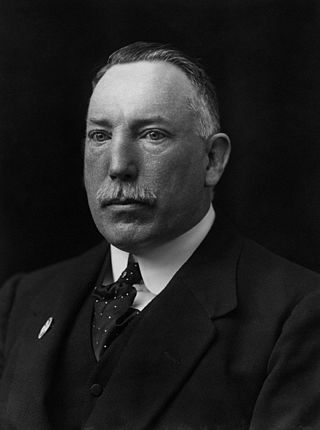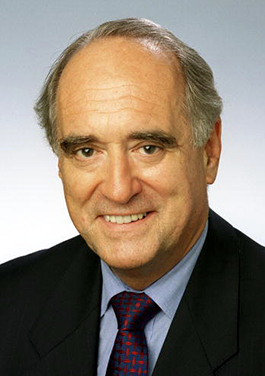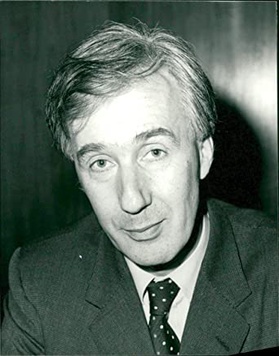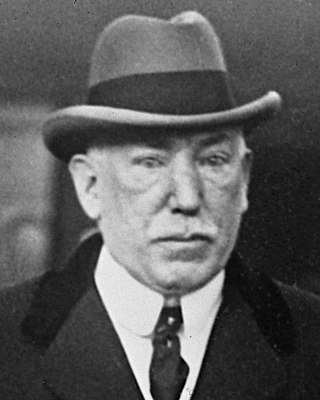
James Craig, 1st Viscount CraigavonPC PC (NI) DL, was a leading Irish unionist and a key architect of Northern Ireland as a devolved region within the United Kingdom. During the Home Rule Crisis of 1912–14, he defied the British government in preparing an armed resistance in Ulster to an all-Ireland parliament. He accepted partition as a final settlement, securing the opt out of six Ulster counties from the dominion statehood accorded Ireland under the terms of the 1921 Anglo-Irish Treaty. From then until his death in 1940, he led the Ulster Unionist Party and served Northern Ireland as its first Prime Minister. He publicly characterised his administration as a "Protestant" counterpart to the "Catholic state" nationalists had established in the south. Craig was created a baronet in 1918 and raised to the Peerage in 1927.

The secretary of state for Scotland, also referred to as the Scottish secretary, is a secretary of state in the Government of the United Kingdom, with responsibility for the Scotland Office. The incumbent is a member of the Cabinet of the United Kingdom. The Secretary of State for Scotland serves as the custodian of the Scottish devolution settlement as outlined in the Scotland Act 1998, and represent Scottish interests within the UK Government as well as advocate for UK Government policies in Scotland. The secretary of state for Scotland is additionally responsible for partnership between the UK Government and the Scottish Government, as well as relations between the Parliament of the United Kingdom and the Scottish Parliament.

The Northern Ireland Assembly, often referred to by the metonym Stormont, is the devolved legislature of Northern Ireland. It has power to legislate in a wide range of areas that are not explicitly reserved to the Parliament of the United Kingdom, and to appoint the Northern Ireland Executive. It sits at Parliament Buildings at Stormont in Belfast.
The Northern Ireland Executive is the devolved government of Northern Ireland, an administrative branch of the legislature – the Northern Ireland Assembly, situated in Belfast. It is answerable to the assembly and was initially established according to the terms of the Northern Ireland Act 1998, which followed the Good Friday Agreement. The executive is referred to in the legislation as the Executive Committee of the assembly and is an example of consociationalist ("power-sharing") government.

Patrick Barnabas Burke Mayhew, Baron Mayhew of Twysden, was a British barrister and politician.

Brian Stanley Mawhinney, Baron Mawhinney, was a British Conservative politician. He was a member of the Cabinet from 1994 to 1997 and a member of Parliament (MP) from 1979 to 2005.

Nigel Alexander Dodds, Baron Dodds of Duncairn,, is a Northern Irish unionist politician and barrister serving as Leader of the Democratic Unionist Party (DUP) in the House of Lords since 2021. He previously served as deputy leader of the DUP from 2008 to 2021 and leader of the DUP in the House of Commons from 2010 to 2019.

Parliament Buildings, often referred to as Stormont, because of its location in the Stormont Estate area of Belfast, is the seat of the Northern Ireland Assembly, the devolved legislature for Northern Ireland. The purpose-built building, designed by Arnold Thornely, and constructed by Stewart & Partners, was opened by Edward, Prince of Wales, in 1932.

John Julian Ganzoni, 2nd Baron Belstead, Baron Ganzoni, was a British Conservative politician and peer who served as Leader of the House of Lords under Margaret Thatcher from 1988 to 1990.

North Antrim is a parliamentary constituency in the United Kingdom House of Commons. The current MP is Jim Allister (TUV).

Peter Robert Henry Mond, 4th Baron Melchett, also known as Peter Melchett, was an English farmer, jurist and politician. He succeeded to the title of Baron Melchett in 1973.

David George Hanson, Baron Hanson of Flint,, is a British Labour Party politician who has served as Minister of State for the Home Office since July 2024. He previously served as the member of Parliament (MP) for Delyn from 1992 to 2019. He held several ministerial offices in the Blair and Brown governments, serving in the Home Office, the Ministry of Justice, the Wales Office, the Northern Ireland Office and the Whips' Office. Hanson sat on Ed Miliband's opposition front bench as a shadow treasury minister, and later the shadow immigration minister.

The Privy Council of Northern Ireland was a privy council advising the Governor of Northern Ireland in his role as viceroy of the British Crown, in particular in the exercise of the monarch's prerogative powers. The council was the successor within Northern Ireland of the Privy Council of Ireland, which offered advice to the Lord Lieutenant of Ireland.

Edwin Poots is a British politician from Northern Ireland, serving as Speaker of the Northern Ireland Assembly since February 2024. He served as leader of the Democratic Unionist Party (DUP) from May to June 2021. He was first elected as a Member of the Legislative Assembly (MLA) in 1998.

The Stormont Estate is an estate in the east of Belfast in Northern Ireland. It is the site of Northern Ireland's main Parliament Buildings, which is surrounded by woods and parkland, and is often referred to in contemporary media as the metonym "Stormont".

The Parliament of Northern Ireland was the home rule legislature created under the Government of Ireland Act 1920, which existed from 7 June 1921 to 30 March 1972, when it was suspended. It was subsequently abolished under the Northern Ireland Constitution Act 1973.

Mary Emma Little-Pengelly is a Northern Irish barrister and Democratic Unionist Party (DUP) politician serving as the deputy First Minister of Northern Ireland since February 2024. She has been a Member of the Legislative Assembly (MLA) for Lagan Valley since May 2022, when she was co-opted (appointed) to replace then-DUP party leader Sir Jeffrey Donaldson, who declined to take up his seat following the 2022 election.
In the United Kingdom, intergovernmental relations refers to the relationship, cooperation, and engagement between the UK Government and the Scottish Government, Welsh Government and Northern Ireland Executive.

A Northern Ireland Assembly election will be held to elect 90 members to the Northern Ireland Assembly on or before 6 May 2027.





































